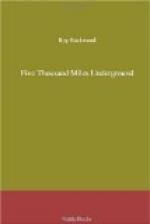Compressed air in strong cylinders furnished a means of breathing, and there were tiny electric lights operated by a storage battery. There was also a chamber to be filled with the lifting gas. The cylinder was so arranged that it would float on it’s long axis if thrown into the water. A trap door hermetically sealed gave access to the interior. A small propeller, worked by compressed air, furnished motive power.
The food supply consisted of compressed capsules on which a man could subsist for several days. There was also some water, but not much, since that can not be compressed and would, therefore, take considerable room.
“The only thing for us to do,” said the professor, “is to get into the cylinder, seal it up, and trust to Providence. This is what I intended to use when we were caught in the draught.”
“How can we get into the column of water after we shut ourselves into the cylinder?” asked Mark.
“The cylinder fits into a sort of improvised cannon,” said Mr. Henderson. “It is fired by electricity and compressed air. “We will aim it at the column, press the button and be projected into the midst of the water. Then——” He did not finish the sentence, but the others knew what he meant.
“When are we to start?” asked Mark.
“As soon as possible,” replied the professor. “I must arrange the cylinder, compress the air and lay out the food supply.”
It took the rest of the day to do this, as the inventor found it would be advisable to attach a weight to the end of the cylinder, to hold it upright in the column of water. The weight could be detached automatically when they were shot up into the midst of the ocean, where, as Hankos had told them, the column spurted forth.
Then some food was stored in the tiny ship that was destined to be their last hope, and some tanks of water were placed in it.
“I think we are almost ready,” Mr. Henderson said about noon the next day.
“What about our gold and diamonds?” asked Jack suddenly. “Can we take them with us in the cylinder?”
“That’s so!” exclaimed Mr. Henderson. “I forgot about them. I’m afraid we’ll have to leave the riches behind. We will not be able to carry them and the food we need, for it may be a week or more before we can leave the cylinder. Gold and diamonds will be a poor substitute for something to eat.”
“I’m goin’ t’ take mine!” said Washington with much conviction. “I might as well starve rich as starve poor!”
“We may be able to take a few diamonds,” the professor answered. “The gold will be too heavy. Let each one select the largest of the diamonds he has and put them in his pockets.”
Then began a sorting of the wealth. It was strange, as they recalled afterward, throwing away riches that would have made millionaires envious, but it had to be done. All the wealth in the world would not equal a beef capsule when they were starving, and they realized it. So they only saved a few pieces of gold as souvenirs, and took the best of the diamonds. But even then they had a vast fortune with them.




